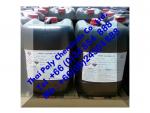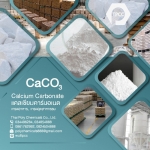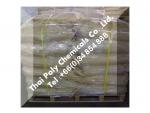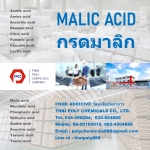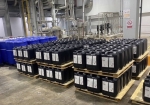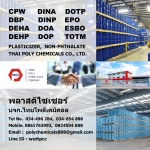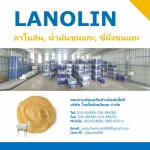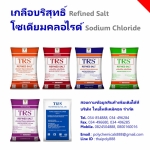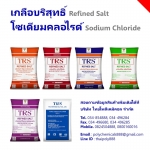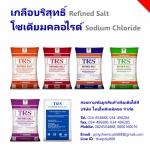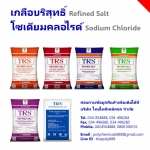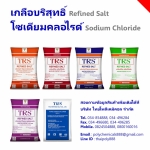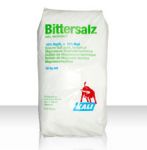เฟอร์ริกคลอไรด์, เฟอริกคลอไรด์, Ferric chloride, FeCl3, เฟอร์ริคคลอไรด์, เฟอริคคลอไรด์ |
฿1 |
|
ชื่อผู้ประกาศ : ไทยโพลีเคมิคอล เบอร์โทรศัพท์ : 034854888, 034496284 โทรศัพท์มือถือ : 0800160016 ที่อยู่ : 36/5 ม.9 ต.นาดี อ.เมืองสมุทรสาคร จ.สมุทรสาคร 74000 ร้าน Thai Poly Chemicals |
Ferric
Chloride, เฟอริกคลอไรด์, เฟอร์ริคคลอไรด์
ไอเอิร์น(III) คลอไรด์ (อังกฤษ: Iron(III) chloride) เรียกอีกอย่างว่า
เฟอร์ริคคลอไรด์ (อังกฤษ: ferric chloride) เป็นขนาดโภคภัณฑ์ในอุตสาหกรรมสารประกอบเคมีที่มีสูตร
FeCl3 สีของผลึกไอเอิร์น(III) คลอไรด์ขึ้นอยู่กับมุมมอง
โดยเกิดแสงสะท้อนผลึกจะปรากฏเป็นสีเขียวเข้ม ละอองในอากาศชื้น มันไม่ค่อยเป็นที่สังเกตในรูปแบบตามธรรมชาติ ใช้บำบัดน้ำเสียโดยการทำให้เกิดตะกอน ที่ละลายอยู่ในน้ำให้อยู่ในรูปที่ไม่ละลายน้ำ เป็นการสร้างตะกอน สารนี้จะทำปฏิกิริยากับสารต่าง ๆ ที่ละลายอยู่ในน้ำ
Ferric
Chloride is mainly used for the engraving etching of electronic circuit board
Ferric
chloride
(1)Product
Name:Ferric Chloride
(2)Product
Package:HDPE drum or IBC tank.
(3)Product
Instroduction:mainly used in circuit printing plate, stainless steel, mold, souvenir badge,waste water disinfection and treatment, sterilization,deodorization, photographic plate making, lumber soaking
Iron(III)
chloride, also called ferric chloride, is an industrial scale commodity chemical compound, with the formula FeCl3. The colour of iron(III) chloride crystals depends on the viewing angle: by reflected light the crystals appear dark green, but by transmitted light they appear purple-red. Anhydrous iron(III) chloride is deliquescent, forming hydrated hydrogen chloride mists in moist air. It is rarely observed in its natural form, mineral molysite, known mainly from some fumaroles. When dissolved in water, iron(III) chloride undergoes hydrolysis and gives off heat in an exothermic reaction. The resulting brown, acidic, and corrosive solution is used as a flocculant in sewage treatment and drinking water production, and as an etchant for copper-based metals in printed circuit boards. Anhydrous iron(III) chloride is
Uses
Industrial
In
industrial application, iron(III) chloride is used in sewage treatment and drinking water production.[13] In this application, FeCl3 in slightly basic water reacts with the hydroxide ion to form a floc of iron(III) hydroxide, or
[Fe(H2O)6]3+ + 4 HO? ? [Fe(H2O)2(HO)4]? + 4 H2O ? [Fe(H2O)O(HO)2]? + 6 H2O It is also used as a leaching agent in
chloride hydrometallurgy, for example in the production of Si from FeSi. (Silgrain process) Another important application of iron(III) chloride is etching copper in two-step redox reaction to copper(I) chloride and then to
FeCl3 + Cu ? FeCl2 + CuCl FeCl3 + CuCl ? FeCl2 + CuCl2
Iron(III)
chloride is used as catalyst for the reaction of ethylene with chlorine, forming ethylene dichloride (1,2-dichloroethane), an important commodity chemical, which is mainly used for the industrial production of vinyl chloride, the monomer for making PVC. H2C=CH2 +
Laboratory
use
In
the laboratory iron(III) chloride is commonly employed as a Lewis acid for catalysing reactions such as chlorination of aromatic compounds and Friedel-Crafts reaction of aromatics. It is less powerful than aluminium chloride, but in some cases this mildness leads to higher yields, for example in the alkylation of benzene: The ferric chloride test is a traditional colorimetric test for phenols, which uses a 1% iron(III) chloride solution that has been neutralised with sodium hydroxide until a slight precipitate of FeO(OH) is formed. The mixture is filtered before use. The organic substance is dissolved in water, methanol or ethanol, then the neutralised iron(III) chloride solution is added?a transient or permanent coloration (usually purple, green or blue) indicates the presence of a phenol or enol. This reaction is exploited in the Trinder spot test, which is used to indicate the presence of
Other
uses
Used in anhydrous form as a drying reagent in
certain reactions. Used to detect the presence of phenol compounds in organic synthesis e.g.: examining purity of synthesised Aspirin. Used in water and wastewater treatment to precipitate phosphate as iron(III) phosphate. Used by American coin collectors to identify the dates of Buffalo nickels that are so badly worn that the date is no longer visible. Used by knife craftsmen and sword smiths to stain blades, as to give a contrasting effect to the metal, and to view metal layering or imperfections. Used to etch the widmanstatten pattern in iron meteorites. Necessary for the etching of photogravure plates for printing photographic and fine art images in intaglio and for etching rotogravure cylinders used in the printing industry. Used to make printed circuit boards (PCBs). Used in veterinary practice to treat overcropping of an animal's claws, particularly
Reacts with cyclopentadienylmagnesium bromide
in one preparation of ferrocene, a metal-sandwich complex. Sometimes used in a technique of Raku ware firing, the iron coloring a pottery piece shades of pink, brown, and orange. Used to test the pitting and crevice corrosion resistance of stainless steels and other alloys. Used in conjunction with NaI in acetonitrile to mildly reduce organic azides to primary amines. Used in an animal thrombosis model. Iron(III) chloride, also known as ferric chloride, is a chemical compound. Its chemical formula is FeCl3. It has iron and chloride ions in it. The iron is in its +3 oxidation state. Iron(III) chloride is a yellow solid. It dissolves in water to make a colloid of iron(III) oxide, making the water look muddy. When it is dissolved in an acidic solution, it is bright yellow. When it is very concentrated in a solution, it is dark brown. It is corrosive to skin and metals. It reacts with iron to produce iron(II) chloride. It fumes hydrochloric acid in moist air. It is a weak oxidizing agent. It reacts with copper(I) chloride to make copper(II) chloride. It breaks down when heated to make chlorine and iron(II) chloride. It is used in sewage processing. It reacts with slightly basic water to make a "floc" that can remove things from the water. It used to react with copper in circuit boards; iron(III) nitrate is sometimes used too. It is used as a catalyst in making plastics. It is used in certain tests as a reagent. Ferric chloride is the coagulant of choice for many industrial and sanitary wastewater treatment applications, due to its high efficiency, effectiveness in clarification, and utility as a sludge dewatering agent. The chemical leaves slight residual color, and offers very
Typical
Applications:?Industrial and sanitary wastewater treatment
?Inks,
food, metals, and oily wastes
?Blood
removal
?Chelate
destruct
?Sludge
dewatering
?Metals
precipitation
?TSS,
FOG, BOD, and COD removal
Properties
and Applications
? Ferric chloride is used in a wide range of
applications including surface water clarification, colour removal, heavy metal precipitation, industrial effluent treatment and phosphate precipitation in
?
Ferric chloride generally exhibits an optimum pH band and it is important to
?
The inherent pH depression and alkalinity consumption in its coagulation mechanism generally necessitates a lime dosing facility or similar especially for low alkalinity waters to achieve the optimum pH range for effective coagulation. PH correction for stability is invariably required under these
?
In potable water, ferric chloride is used mainly under low turbidity conditions and while capable of clarifying high turbidity water in combination with lime, an increasing coagulant aid dosage is recommended as higher turbidity levels
?
A handling and dosing facility suitable for a corrosive liquid is a prerequisite for ferric chloride use. Heavy-duty HDPE tanks are recommended for
?
FeC should be metered undiluted through a corrosion resistant positive displacement-dosing pump with subsequent dilution at the dosing point if deemed necessary for rapid dispersion through the water body. The in-line dilution
สอบถามข้อมูลเพิ่มเติมได้ที่
ฝ่ายขาย
Thai
Poly Chemicals Co., Ltd.
บริษัท
ไทยโพลีเคมิคอล จำกัด
ที่อยู่36/5
ม.9 แขวง/ตำบลนาดี เขต/อำเภอเมืองสมุทรสาคร จังหวัดสมุทรสาคร รหัสไปรษณีย์74000
Tel.:
034854888, 034496284
Fax.:
034854899, 034496285
Mobile:
0824504888, 0800160016
Website
: www.thaipolychemicals.com
Email1 : thaipolychemicals@hotmail.com
Email2 : info@thaipolychemicals.com
เฟอริกคลอไรด์chlorideเฟอร์ริกคลอไรด์FeCl3เฟอร์ริคคลอไรด์Ferricเฟอริคคลอไรด์

